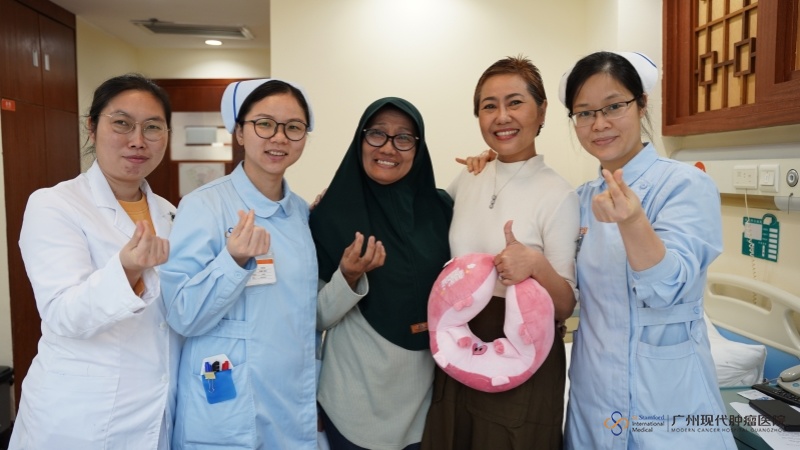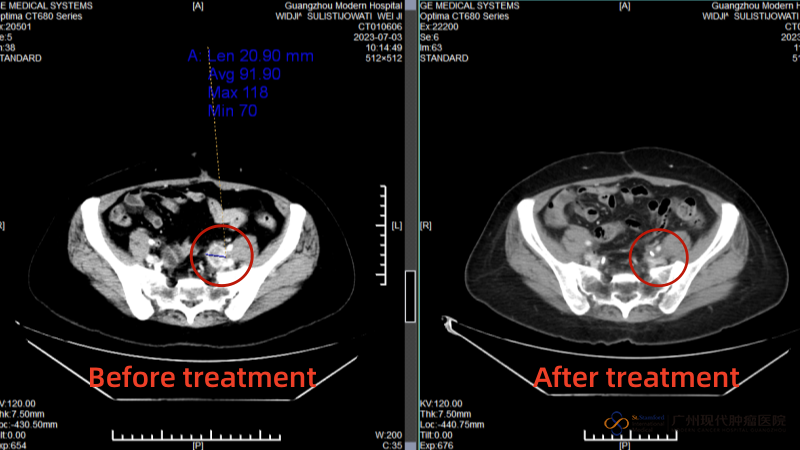In May 2023, Wei Ji (pseudonym), who had stage III cervical cancer, relapsed one month after surgery and came to our hospital (St. Stamford Modern Cancer Hospital Guangzhou) to seek better treatment methods, hoping to improve treatment hope.

(Weiji)
After total hysterectomy, the tumor still metastasized
Weiji recalled that her first physical problem was in March 2023. Three years after menopause, she developed vaginal bleeding, which lasted for three days. She went to see a gynecologist, and the examination result was cervical cancer. Although the result was hard to believe, Weiji and her family resolutely followed the doctor's advice and carried out active treatment. In early April, she underwent radical surgery to remove all the uterus and accessories.
For early-stage cervical cancer, the 5-year survival rate of total resection can reach more than 90%. However, Weiji's diagnosis was stage III at that time, and the surgical effect was not ideal. The postoperative pathology showed that there were multiple lymphatic metastases in the left pelvic wall. The local doctor suggested that Weiji continue to undergo 6 rounds of chemotherapy and 33 rounds of radiotherapy. Weiji rejected the proposal, learned about St. Stamford Modern Cancer Hospital Guangzhou with the recommendation of relatives and friends, and requested remote consultation in the hospital before admission.
Minimally invasive comprehensive therapy to reduce treatment injury
Remote consultation is our hospital specially set up for international patients, so that patients from all countries can enjoy the preliminary diagnosis of hospital experts at home. Using the remote consultation connection, our hospital’s experts had a "face-to-face" consultation with Weiji, saw her diagnosis in Indonesia, and gave a preliminary treatment plan.
In May, Weiji was officially admitted to the hospital. The doctor once again made a comprehensive examination of Weiji and formulated a minimally invasive comprehensive treatment plan based on "minimally invasive intervention + immunity".
Minimally invasive interventional therapy is a common method for the treatment of tumors. It is to directly deliver chemotherapy drugs to the tumor site through blood vessels, so that the chemotherapy drugs can directly play a therapeutic effect on tumor cells. The efficacy is more direct, the effect is faster, and the harm to human body is less.
However, the treatment was not successful. Weiji was not sensitive to the chemotherapy drugs used in the first interventional treatment. CT showed that the tumor not only did not decrease, but increased. The attending doctor said, "it is common for chemotherapy drugs to be ineffective for patients. According to Weiji's situation, we convened MDT experts for consultation, and customized the scheme for Weiji again. We changed the chemotherapy drugs and added another radiotherapy. It was supplemented with traditional Chinese medicine and natural therapy to minimize the damage to patients." Weiji's situation soon improved after the second treatment. Re-examination in November showed that the tumor had shrunk and tumor markers had been normal.

Weiji said, "all the treatments have certain side effects, but it is done very well here. Every time I feel pain or uncomfortable, the doctors and nurses will deal with it immediately. The pain doesn't torture me for a long time, and the whole treatment process is relatively easy. Thank the medical staff here for taking care of me."

My condition is stable and I'm happy to go home
After 3 months of treatment, the existence of tumor could not be seen on CT. Weiji's condition was basically stable. On November 24, Weiji was discharged from the hospital happily. Before leaving the hospital, she said, "I hope other patients can also get good treatment. Don't give up. God will bless us. I believe St. Stamford Modern Cancer Hospital Guangzhou’s doctors, if we patiently go through all the treatment process, everything will be better."

Like Weiji, postoperative metastasis and recurrence is a very common phenomenon, which is an important feature of malignant tumors. There are many treatment methods and means for patients with intermediate and advanced tumors after recurrence. Our hospital has improved the quality of life and prolonged the survival of tens of thousands of patients such as Weiji by using minimally invasive comprehensive treatment of tumors. Many patients have lived a healthy life for 5 or 10 years after the treatment of tumor minimally invasive technology, and there is no sign of recurrence so far. Believe in modern medicine, we can overcome cancer one day.
*Surgery, in addition to the appropriate chemotherapy and radiotherapy, are effective in treating early cancer, but certain patients in late stage of cancer may not be tolerate surgery well as they can be relatively weak. A combination of carefully planned minimally invasive therapy, chemotherapy or radiotherapy can effectively reduce the side effects and discomfort of treatment and may help patient get better efficacy.













 viber
viber